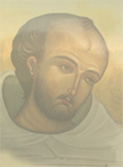| |
Part 1 and 2. Introduction. In the gratifying silence |
|
 |
Juan Yepes de Alvarez, Saint Juan de la Cruz (1542 – 1591), a close associate of Teresa of Avila in reformation of the Carmelite order. A monk and a poet. He is not a poet who expresses only himself, but he, through whose poetry love for people is promulgated and called upon, including as rendered by the Lord. Through images, prompted to the poet, a searching man approaches what he seeks, i.e. a face-to-face encounter with Him, for Whose sake and for the Love of Whom we, actually, come into being from non-existence. The being, from the first, is the Lord Himself, for nothing exists outside the Lord. The Lord let Juan partake of the font of "Living water", i.e. of Himself. However, before giving him this experience, he asked what he wanted from Him, to which Juan immediately replied that he wished to suffer for Christ. And so the Lord gave him what he solicited. Juan was seized by adversaries of the reform and thrown into a tiny ward, a former cesspit where the sole source of air and light was a crack in the ceiling between the boards, two fingers thick. Staying in confinement for over a year, Juan sustained great bodily harm. But what was worst than anything for him was, probably, the inability to serve the mass and perform Eucharist. It was in this dark cell, in solitude and seeming hopelessness that the Lord reveals Himself to Juan as a source of love eternal, love all-creating and all-supporting. Following this, he receives verbal and poetic images showing the experience he gained in meeting Light in the night. Man's realization of his restrictions and imperfections evolves into the desire to overcome them, get rid of them and enter into infinite Love. This realization gives rise to the "Song of the Spirit". Juan sought the Source and, like every seeker, in accordance with Christ's commandments, he found it. "Song of the Spirit" is a title of a poem written by him in confinement. Song of the spirit can be a definition of his entire short sojourn on earth. This is a way of a poet who had left just a bunch of poems for posterity and was subsequently declared poets' patron. This is also a way of a monk who had written just a few spiritual treatises and was later recognized as teacher of Church. |
|
| The interest in the Spanish saint Juan dela Cruz arose in me many years ago, that is, in the 80s of the past century. learned the name of Juan while reading a book Tales of Power by Carlos Castaneda. In it, the lines of his poem about a lonely bird were presented as an epigraph. Also there, a work was shown from which they were taken, Talks of light and love. Right after the second reading the lines of this little poem rang clear and captivated me so that I took a whole decade to look for the said book and the information about its author. In the Soviet era the books like Tale of Power used to be circulated in Xerox copies and we learned about them and their authors by chance, through our acquaintances. Nobody in my near or distant environment had a vaguest idea about Juan and his Talks. Back then I was not yet a churchgoer and all my links to and connections with church were far away from God's house. I was preoccupied with the Oriental culture, mystics and faith. It was a surprise to me to learn that Juan had been rather a monk than a poet. At first, I wrote a vocal and instrumental miniature based on a text. Subsequently, this became the fifth part of The Five Signs of a Solitary Bird, followed by introduction that lays out the message of the entire work. Subsequent to a lengthy search, and only in the mid 90s, I succeeded in finding The Talks in the original. At my request, the book had been translated into Russian for me. To my surprise, this turned out to be not a poetic work, as I believed, through my ignorance, it ought to be, but a condensation of precepts for the Carmelites monastery written by Juan at the request of Teresa of Avila where the above text was the sole sample of a poetic sensible prose rather than a poem. It was from this literal translation that I chose textual fragments that had sounded in me. I processed them and put to music. The second, third and fifth parts were written based on the texts of The Talks. Two others were created similarly based on the word-for-word translation of his poems. The fourth and sixth parts were The Dark Night and The Live Flame of Love. Such an approach to the literary matter determined such a long title of the work, Fantasy on the Chosen Texts from Works by Juan de la Cruz. For the first time, four parts of this work were performed at the author's concert in the Glinka Museum in 2002. In 2005, a disc was recorded, entitled In the Dark of Night. To ease the listener's perception of the original text, I supply it in full. 2
On the Use of Boris Levitsky photo of a series of “Italy” |
||